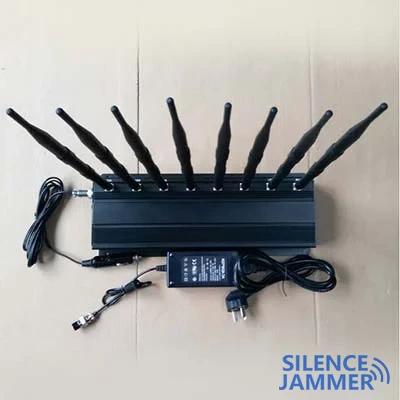A signal jammer device is a device that interferes with wireless communications by emitting electromagnetic waves in a specific frequency band. They have applications in a variety of scenarios, including protecting privacy, blocking inappropriate surveillance, and ensuring security. A common question is, can a signal jammer stop surveillance equipment from recording? This article will explore this issue and analyze its working principle and practical effects.

How signal jammers work
Signal jammers emit strong electromagnetic waves to cover the communication signals of the target device, making it unable to receive and send data normally. This interference can be for various communication signals such as Wi-Fi, Bluetooth, GPS, and mobile phone signals.
- Interference with wireless cameras
- Impact of wired cameras
Wireless cameras rely on Wi-Fi, Bluetooth or mobile networks (such as 4G, 5G) for data transmission. Signal jammers can interrupt video transmission by emitting interference signals that prevent cameras from communicating with routers or control devices. However, this does not necessarily mean that the camera will stop recording.
Wired cameras transmit data over physical cables, which are less affected by signal jammers. However, some advanced signal jammers can affect the camera's circuitry through electromagnetic interference, causing it to temporarily malfunction.

The impact of signal jammers on the recording function
- Wireless camera
- Wired camera
- Electromagnetic interference equipment
Whether a signal jammer can stop a surveillance device from recording depends on the type of device and how it works.
For wireless cameras, signal jammers can effectively block video transmission. If the camera relies on real-time transmission of data to a remote server or monitoring center, signal interruption may cause recording to stop or fail to be stored. However, many modern wireless cameras have local storage capabilities (such as SD cards), and even if communication is interrupted, the camera will continue to record and store the video locally. When the signal is restored, these videos can be uploaded.
Signal jammers have limited direct impact on wired cameras. These cameras typically rely on network cables (such as Ethernet cables) or coaxial cables to transmit data. Unless very powerful electromagnetic interference equipment is used, ordinary signal jammers are difficult to affect wired transmission.
Certain high-power electromagnetic interference devices can interfere with the circuits of electronic equipment, causing the equipment to temporarily malfunction. However, this interference usually requires close proximity to the target device and may also have an impact on other surrounding electronic devices.

Practical applications and legal considerations
Practical application
Signal jammers have application value in certain legal and special scenarios. For example:
Exams and meetings: Preventing cheating and illegal recording.
Military and security locations: Interrupt enemy communications and surveillance.
Private places: protect personal privacy.
Legal considerations
There are legal and ethical issues involved in using signal jammers. In many countries and regions, the unauthorized use of signal jammers is illegal because they may interfere with legitimate communications and affect public safety and the privacy of others. Specific legal provisions vary from place to place, but generally speaking, unauthorized interference with the communications of another person's device may face serious legal consequences.
Signal jammers can interfere with the communication of wireless surveillance devices, making it impossible to transmit video data in real time, but they may not completely stop recording, especially for cameras with local storage capabilities. Wired cameras are more resistant to signal jammers. The scientific and reasonable use of signal jammers can reduce the negative impact on others and public facilities while protecting privacy and security.


